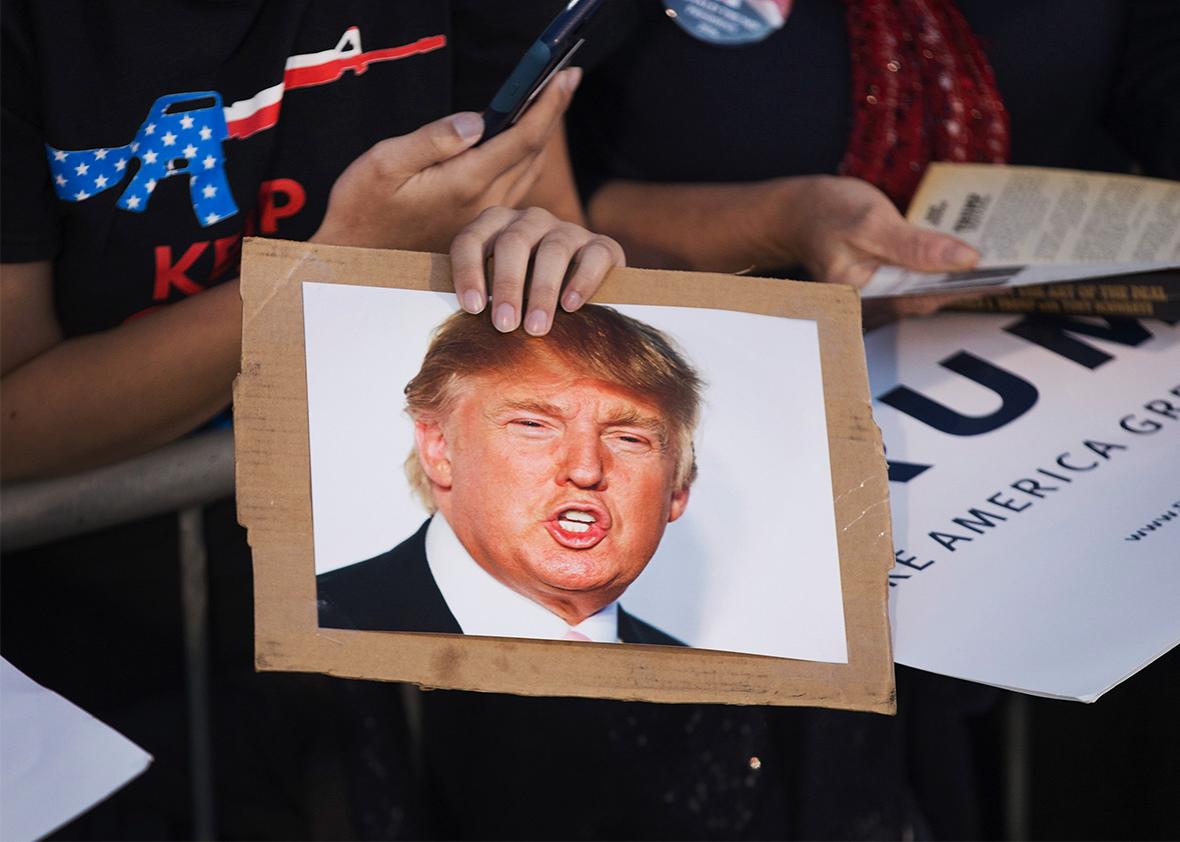Donald Trump is set to win most, if not all, of the 12 Super Tuesday nominating contests tomorrow, maintaining his dominant position even as his Republican opposition is finally attacking him with all they’ve got. The primary calendar will not help Trump’s opponents stage a comeback; if anything, it helps Trump, who has the ability to land a knockout blow on his most viable competitor, Sen. Marco Rubio, in the March 15 Florida primary. Trump’s support keeps growing as he continues winning states—imagine that!—to the extent that, at this point, it may not matter whether the anti-Trump field consolidates or not. CNN’s latest national poll finds Trump’s support at 49 percent to Rubio’s 16 and Sen. Ted Cruz’s 15, and Trump wallops each senator in a head-to-head. Unless Rubio, Cruz, and affiliated anti-Trump outside groups can persuade the masses that Trump is a fascistic con man by the winner-take-all-states on March 15, Trump is en route to an easy majority of delegates.
This means that it will soon be time for Republican leaders, whose preferences primary voters cared very little about this cycle, to choose: Are they in or out? Will they sign on with the figure who hijacked their party and whose nomination threatens down-ballot races, or will they disavow him and begin looking toward 2020?
There is no obvious answer, and if the early sorting process tells us anything, it’s that everyone’s for themselves. New Jersey Gov. Chris Christie, for example, had plenty to gain by signing up early with Trump—perhaps vice presidential or Attorney General consideration. Nebraska Sen. Ben Sasse, meanwhile, has a safe Senate seat and hopes that his party will remain the Senate majority in the next Congress, so he loses relatively little for speaking his conservative conscience and saying that he’ll never support Trump. And Alabama Sen. Jeff Sessions endorsed Trump because he genuinely shares a nativist passion with Trump on their mutual driving issue of immigration.
Senate Majority Leader Mitch McConnell is encouraging candidates to denounce the Republican presidential nominee if that’s what it takes to preserve his Senate majority. McConnell, as the New York Times reported this weekend, “has laid out a plan that would have lawmakers break with Mr. Trump explicitly in a general election.” He has freed senators to “run negative ads about Mr. Trump to create space between him and Republican senators seeking re-election” and has “raised the possibility of treating Mr. Trump’s loss as a given and describing a Republican Senate to voters as a necessary check on a President Hillary Clinton.”
This makes a lot of sense: After two terms of the Obama administration, Republicans are comfortable serving as the opposition party. They could block the Clinton administration from achieving much of anything, as they know from experience. Though they would (theoretically!) have to grant Clinton a Supreme Court seat, their control of the Senate would give them leverage to demand a more centrist candidate. And since Hillary Clinton is not a very popular political figure, and Democrats will have held the presidency for three consecutive terms, the fundamentals for 2020 would be in Republicans’ favor.
There is a problem, though. Votes have been cast, and Trump has been winning them. This indicates that Republican voters like Donald Trump. For elected Republican leaders to disavow Trump as an official leadership position at this point is not just to disavow the opinions of many of their voters, but to disavow the very idea of nominating presidential candidates by primary. If the voters send party leaders a nominee that they don’t want, and leaders’ response is to disavow the nominee, what respect does that show for the process? This is the stuff from which party breakups are made. It would be much harder for Republicans to oust Clinton in 2020 if there’s no longer any unified Republican coalition to speak of.
This is why, despite all the handwringing, Republican leaders’ consensus posture toward Trump is most likely going to be an extension of RNC chair Reince Priebus’ posture toward Trump throughout the primary: Smile, damnit. License those individual senators to disavow Trump if his nomination violates either their conscience or, more importantly, their own political prospects. Otherwise, nominate the dude. Give him party resources throughout the general election. Go on television and say that Hillary Clinton is the real disaster in the race as a dodge to pretty much any question asked about Donald Trump. Lose, then regroup in 2020 and try to stop the Democrats’ presidential winning streak at three.
And hope that Trump, having found that the Republican Party treated him fairly in 2016, does not have any excuse to run again in 2020 as an independent.
